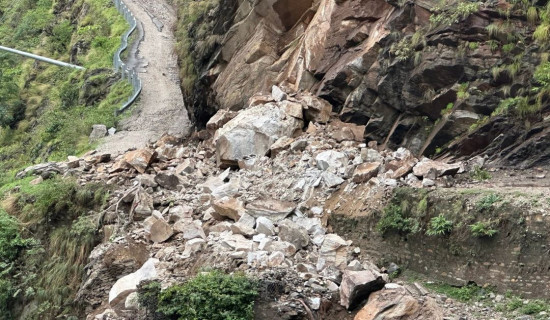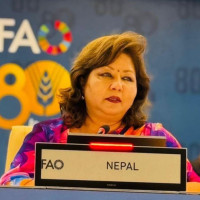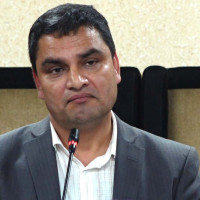- Tuesday, 1 July 2025
Calls for unified action on Shock-responsive social protection
By TRN Online, Lalitpur, June 27: A workshop titled 'Shock Responsive Social Protection: Situation and Need' concluded on Thursday in Lalitpur, bringing together Members of Parliament, senior government officials, development partners, civil society representatives, and social protection practitioners. The workshop was hosted by the Social Protection Civil Society Network (SPCSN).
Welcoming the participants, Chairman of SPCSN Tilottam Paudel highlighted Nepal’s vulnerability to multi-hazard risks and emphasised the urgency of making the social protection system responsive to disasters.
Nepal, ranked 10th in the Global Climate Risk Index, has experienced over 191 major disasters between 2000 and 2019. These crises have disproportionately affected the most vulnerable groups: women, children, the elderly, persons with disabilities, and marginalised communities. The workshop emphasised the critical need to move beyond reactive relief mechanisms toward a Shock Responsive Social Protection (SRSP) system that ensures long-term security, resilience, and equitable disaster response.
Former member of the National Planning Commission Ram Kumar Phuyal shed light on the newly introduced Integrated Social Protection Framework 2080, which revolves around five key principles: integration, institutionalisation through a national council, coordination across tiers of government, efficient implementation, and sustainability. He stressed that the framework serves as a foundation for adopting SRSP in disaster contexts.
Lawmaker Sita Kumari Rana criticised the lack of anticipatory disaster planning and funding, especially for vulnerable groups like women, children, persons with disabilities, and those left behind. She expressed hope that the new SRSP and Relief Distribution Guidelines, 2081, will help embed disaster considerations into all stages of planning and response.
Parliamentarian Jiwan Pariyar echoed this sentiment, advocating for the federal government to develop a digital platform that incorporates social security allowance (SSA) beneficiaries. He emphasised that such a system would ensure transparency and efficient relief distribution.
World Bank representative Jyoti Maya Pandey pointed out the current fragmentation of Nepal’s 87 social protection programs, each with separate databases and targeting mechanisms.
European Union representatives Sujit Maharjan called for improved coordination among all three tiers of government, agile monitoring mechanisms, and a unified registration system covering all social protection schemes to support SRSP and relief standards.
Addressing the vulnerability of children during disasters, Joint Secretary of the Ministry of Women, Children and Senior Citizens, Chakra Bahadur Budha, shared alarming data indicating that around 700,000 children may be affected by this year’s monsoon. He urged the need for a child-focused disaster management plan encompassing rescue, relief, response, and recovery.
The consultative workshop featured in-depth discussions, culminating in key recommendations for better data integration, improved coordination, and inclusive disaster response strategies.






-original-thumb.jpg)








